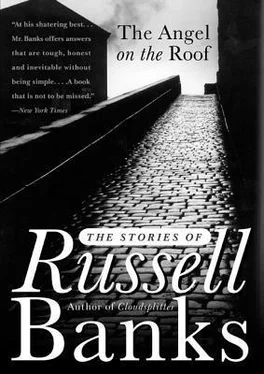“You preaching to me, Merle, goddamnit?”
“Nope. Just thinking out loud. Not used to company.”
“Hey, that’s all right, I understand. Shit, it must get awful lonely out here. I’d go nuts. It’s good for thinking, though. Probably. Is that the kinda stuff you think about out here, Merle, all that shit about will and intending?”
“Yep.” A red flag on one of the tip-ups suddenly sprung free, and in a single, swift motion Merle was off the bench and huddled over the line, watching it run off the spool and then stop. He jerked it, set the hook, and started retrieving the fish. “Black bass,” he said to no one in particular. It was a small one, not two pounds. Merle drew it through the hole, removed the hook from its lip, and deposited the fish in the bucket of ice chips scooped from the holes.
“If I was you, I’d be thinking all the time about how I was going to spend all that money,” Claudel went on. “You talk about will and intentions!” he laughed. “How do you intend to spend the money, Merle? Fifty thousand bucks! Jesus H. Christ.”
“Can’t say.” He rebaited the hook and wound the line back onto the spool.
“You mean, you don’t know?”
“What d’you think my intentions toward that much money ought to be? Can’t spend it, not the way I live. ’Course, I haven’t got it yet, so it ain’t like we’re talking about reality.”
“No, we’re talking about money!” Claudel said, leering.
“All I know is death and taxes. That’s reality. I intend to pay my taxes, and I intend to die.”
“Merle, you are fucking crazy,” Claudel said. “Crazy. But smart. You’re smart, all right. You coulda been a lot of things if you’d wanted to. Big. A businessman.”
“I always did what I wanted to,” Merle said gloomily. Then, as if writing a letter, he said, “I was a carpenter, and I was married, and I fathered some children. Then I got old. Everyone gets old, though, whether he intends to or not.”
They were silent in the darkness for a moment.
“Yeah,” Claudel said, “but you got lucky. You won the lottery!”
“It don’t matter.”
“Of course, it matters, you asshole !”
“Not to me.”
“Well, it matters to me, goddamnit!”
Merle remained silent this time, and, after a while, Claudel’s bottle was empty. Without leaving his seat, he reached over, opened the door, and pitched the bottle out. “It’ll sink in spring,” he mumbled. Then slowly, awkwardly, he pulled his coat on and stumbled out the door, not bothering even to say good-bye.
Daily, with and without ceremony, they came out to the bob-house. The younger ones, Terry Constant, Noni Hubner, Bruce Severance, Leon LaRoche, Doreen Tiede, and poor Claudel Bing, could pretend they just happened to be in the neighborhood, ice-skating, skiing, walking, or, as in Claudel’s case, bored and lonely and thought to drop in for a visit. The older ones, however, found it difficult to be casual about their visits. As Merle had said, you expect the actions of adults to have intention behind them and therefore meaning. The adults tend to expect it of themselves, too. Carol, Terry Constant’s older sister, claimed she walked all the way out to the middle of the lake against a cold wind because she had never seen anyone ice-fishing before and wanted to learn how it was done. While there, the only question she asked Merle directly was how would he spend the money, if he won on the fifteenth. He said he didn’t know. Nancy Hubner baked Merle a minced meat pie (she said it was his favorite) and insisted on carrying it to him herself. While he ate a piece of the pie, she told him how excited she was at the prospect of his becoming a wealthy, carefree man, something she said everyone deserved. He agreed. Captain Dewey Knox appeared one morning at the bob-house to confirm Leon LaRoche’s claim that Merle had signed a document authorizing Leon to act as his agent at the Grand Prize Drawing. Merle said yes, he had signed such a document. “Without coercion?” the Captain asked. Merle said he couldn’t be sure, because he didn’t know how a person went about coercing someone to sign something. “But you understood fully the meaning and consequences of your act?” the Captain asked. Merle said he wasn’t drunk or crazy at the time. “And is it true,” the Captain went on, “that you requested young LaRoche to bring your winnings out here in cash? Hundred-dollar bills?” Merle said it was true. The Captain thought that extremely foolish and told Merle, at great length, why. Merle went about his business of fishing and said nothing. After a while, when the Captain had finished telling Merle why he should have Leon LaRoche deposit the money in a savings account at the bank where he was employed, he departed from the bob-house. The last person from the trailerpark to visit Merle’s bob-house came out the day of the drawing, January fifteenth. It was Marcelle Chagnon, and, as the manager of the trailerpark, she felt it was as much her duty as her privilege to announce to Merle that on that day at twelve o’clock noon he had won the $50,000 Grand Prize Drawing.
The winter continued to bear down, quite as if Merle had not won the lottery. There were snowstorms and cruel northeast winds out of Nova Scotia and days and nights, whole weeks, of subzero temperatures. Merle’s money, the five hundred one-hundred-dollar bills delivered by Leon LaRoche, remained untouched in Merle’s cigar box under the bunk in the bob-house. The brand-new bills, banded into thousand-dollar packets, filled the cigar box exactly, and the box, with an elastic band around it, sat in the darkness of the bob-house and the well-lit minds of everyone who lived in the trailerpark. Everyone carried the image of that box around in his or her head all day and night. Some even dreamed about it. Leon LaRoche told Captain Knox that when he delivered the money, the old man in stony silence, as if angry at being interrupted, took the money from the bank pouch, and, without counting it, stacked it neatly into the cigar box and tossed, literally tossed, the box under his bunk. The Captain, as if disgusted, told Marcelle Chagnon, who, worriedly, told Doreen Tiede, who told Claudel Bing that night after making mild, dispassionate love, and Claudel, stirred to anger, told Carol Constant the next morning when, on her way to work, she gave him a lift into town because he hadn’t got out of bed in time to go in with Doreen and her daughter. That evening, Carol told her brother, Terry, because she thought Merle would listen to Terry, but Terry knew better. “That man listens to no one,” he said to Bruce after telling him about the cigar box that contained $50,000, and Bruce, full of wonder and admiration, agreed with Terry and tried to explain the pure wisdom of the act to Noni Hubner, but she didn’t quite understand how it could be wise, so she asked her mother, Nancy, who thought it was senile, not wise.
In that way, within twenty-four hours of Leon’s having delivered the money to the bob-house, everyone in the trailerpark shared an obsession with the image of the cigar box full of hundred-dollar bills. They could think of little else. Merle’s earlier winnings had not achieved anything like this status, but their experience with that considerably lesser amount had gone a long way toward determining how they looked at this new money. The October lottery had dropped $4,500 into Merle’s lap, and the residents of the trailerpark each went to him and asked for some of it and directly received what he or she asked for. This new amount, however, was so incomprehensibly large that no one could apply it to his or her individual needs. Consequently, they applied it to what they saw as the needs of the community as a whole. It was not Merle who had won the $50,000; the trailerpark had won it. Merle had merely represented them in that magical cosmos where anything, absolutely anything, can happen. Of course, it’s probably true that if, on the other hand, what happened to Merle through no effort on his part had been as colossally, abstractly bad as the $50,000 was good , the residents of the trailerpark would not feel that it had happened to the community as a whole. If, for example, Merle were shot in the head by an errant bullet from the gun of a careless deer hunter out of sight in the tamaracks on the far side of the lake, the people in the park would blame Merle for having been out there wandering around on the ice during hunting season in the first place. They would mourn for him, naturally, but his death would be seen forever after as a warning, an admonition. Anyone can be a cause of his or her own destruction, but no one can claim individual responsibility for having created a great good. At least, that’s how the people in the trailerpark felt. Which is why they believed that Merle’s winnings belonged, not to Merle alone, but to the community of which he was a part. And, of course, there was their earlier experience with the $4,500. That sort of proved the rightness of their feeling, gave them something like a logic.
Читать дальше












